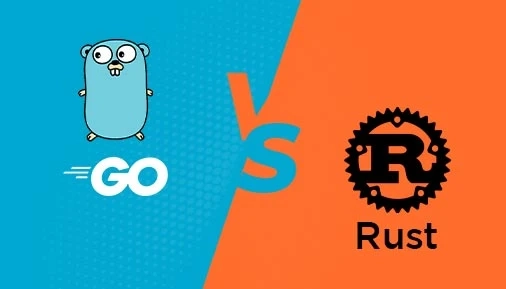Coding languages are the backbone of software development, whether you want to get into web development or not. Programming languages can be broken down into two big categories: low level and high level. The low-level ones, like C, C++, and Rust are compiled directly to machine code and require a lot of manual coding. High-level languages that use interpreters like JavaScript, Python, and Ruby on Rails are more convenient because they do a lot of the work for you behind the scenes to make your life easier.
As a web development company, we have used both types of languages for different reasons and have found that there are pros and cons for each. In this article, we will highlight the strengths of Golang and Rust which might sway your decision if you are currently looking for a web development language.
Let’s get into detail and find out which one is better.
Rust Programming Language:
The Rust programming language is a tool for the modern age. It provides speed and efficiency but also keeps security and reliability in mind. When dealing with existing codebases or libraries, this is critical to ensuring that performance is never sacrificed. In many ways, Rust represents the future of software development, and it’s making waves by taking a hard stance on the efficiency of C++ and the safety of Java.
Advantages of Rust:
Rust is a general-purpose programming language sponsored by Mozilla Research. It is a safe, concurrent, practical language that runs blazingly fast and prevents segfaults by default.It strives to compete directly with C++ in performance while eliminating areas of accidental complexity (at least when compared to C++).This means that Rust has the potential to replace C++ in many cases where low-level memory manipulation is required.Rust has excellent support for working with existing C libraries. It’s designed specifically for that purpose and provides tools (such as the FFI) to make it easy.Because it’s designed to work with existing codebases, Rust code can be easily integrated into any project.Disadvantages of Rust:
One of the biggest setbacks for Rust is its syntax. Despite being a clean, readable language, many developers consider Rust’s syntax to be too abstract at times.Rust’s lack of abstraction leads to a more verbose codebase when compared to Go. The difference in file size between an equivalent Go project and one created with Rust is often around 300-400 lines (depending on size and purpose).Rust also has more idiosyncrasies than Go (for example, while Go has no concept of type; this one does), so it can be harder to use when compared to other languages.Despite having a compiler in place and a strong standard library, there are still relatively few third-party libraries available in Rust. Additionally, there is a lack of documentation and a steep learning curve.The final disadvantage to Rust is the strict adherence to Rust’s design principles. Many developers feel that Rust is too inflexible and immutable sometimes. However, this may not be an issue in areas where safety and security are vital (such as embedded applications). Overall, Rust has excellent support for the language and community, but it’s somewhat unknown, especially in comparison with Go.Go Programming Language:
Go is a programming language developed primarily by Google as an alternative to C++. When you consider its performance benefits compared to C++, it continues to grow in popularity. Though it’s a relatively new language, Go has found its niche in web and server-side application development. It’s designed to be easy to learn, with a strong focus on standardization, safety, and readability.


